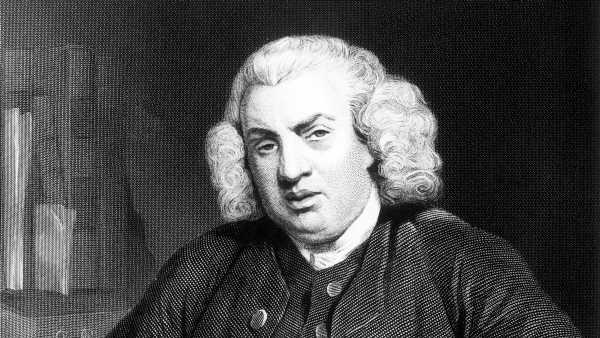Dr Samuel Johnson letter to girl, 12, expected to £12,000
High praise from the ‘father of the dictionary’: Unearthed 18th century letter from the great Dr Samuel Johnson to young girl where he praised her maths skills is set to sell for up to £12,000
- Three-page letter was considered lost by experts, dates back to around 1783
- He was writing to Sophia Thrale, the daughter of his close friend Hesther Thrale
A letter penned by ‘father of the dictionary’ Dr Samuel Johnson to his 12-year-old pen pal is expected to sell for up to £12,000 after being found in a cupboard.
The three-page letter, which was considered lost by experts and dates back to around 1783, was found tucked away with others in the library of a Gloucestershire country house.
He was writing to Sophia Thrale, the daughter of his close friend and rumoured love interest Hester Thrale, who he later fell out with.
The elderly lexicographer – who died in 1784 aged 75 – reassured the girl that she was ‘never likely to lose’ his favour and praised her skills in maths, which he called ‘arithmetick’.
Dr Johnson is most famous for his A Dictionary of the English Language, which was first published in 1755 after the author spent seven years compiling it.
A letter penned by ‘father of the dictionary’ Dr Samuel Johnson to his 12-year-old pen pal is expected to sell for up to £12,000 after being found in a cupboard. The three-page letter, which was considered lost by experts and dates back to around 1783, was found tucked away with others in a cupboard in a Gloucestershire country house
Dr Johnson became acquainted with Sophia when her mother married brewer Henry Thrale in 1763 and moved to London.
His letter to the girl is the only known one from their correspondence to survive.
He told her: ‘My favour will, I’m afraid never be worth much, but its value more or less, you are never likely to lose it.’
Praising her arithmetical ability, he added: ‘Never think, my Sweet, that you have arithmetick enough, when you have exhausted your master, buy books, nothing amuses more harmlessly than computation.’
The author also pointed Sophia to what he called a ‘curious calculation’ relating to the capacity of Noah’s Ark in fellow author John Wilkins’s An Essay towards a Real Character and a Philosophical Language.
The letter was found by auctioneer Werner Freundel, of Chorley’s auction house in Gloucestershire, after he was asked to value a collection of books and rugs.
Dr Johnson is most famous for his A Dictionary of the English Language, which was first published in 1755 after the author spent seven years compiling it
The elderly lexicographer – who died in 1784 aged 75 – reassured the girl that she was ‘never likely to lose’ his favour and praised her skills in maths, which he called ‘arithmetick’
One of the cupboards in the property’s library contained a volume of 100 letters that the family were not aware of.
Towards the end of the volume was Dr Johnson’s letter to Sophia, which until now had been listed as ‘current location unknown’.
The text of it was published in a 1994 book but the physical letter was considered lost.
The letters between Dr Johnson and the Thrale family began in 1765 but then came to an end after Hester’s second marriage to an impoverished Italian music teacher.
Dr Johnson did not approve and they stopped writing to each other in 1783.
The pair reconciled just before his death and Hester went on to publish a book about their letters.
The envelope for Dr Johnson’s letter to Sophia, who he corresponded with more than once
Dr Johnson’s flirtatious relationship with Hester, who was 30 years his junior, has long excited scholars.
She is rumoured to have chained him up before caning him; an act which – according to historian Henry Hitchings in his 2018 biography of the author – ‘both satisfied and punished his sexual urges.’
Also being sold is a series of 30 letters sent between Hester and Sophia. They were written between 1805 and 1821.
The letters, which are encased in a leather album, have never been published.
In the same album is a selection of other letters, mostly to Sophia, from acclaimed stage actress Sarah Siddons.
In one, she complains that she must ’embrace the dreadful fatigue of playing every night.’ The other letters are expected to sell for up to £20,000.
In 1746, Dr Johnson was paid £1,575 – the equivalent of nearly £300,000 today – to compile his dictionary.
In the years he spent writing it, he was threatened with arrest after falling into debt.
The resulting book was at the time the most comprehensive dictionary in the English language.
Also being sold is a series of 30 letters sent between Hester and Sophia. They were written between 1805 and 1821
In the work, Dr Johnson distinguished between 124 senses of the verb ‘to take’ and found 20 meanings of ‘up’.
In 1762, Dr Johnson was granted an annual pension of £300 by King George III.
He used the some of the money to travel to the Hebrides with his male companion, James Boswell.
Besides his dictionary, Dr Johnson is known for his famous phrases, which include: ‘When a man is tired of London, he is tired of life; for there is in London all that life can afford.’
Source: Read Full Article






